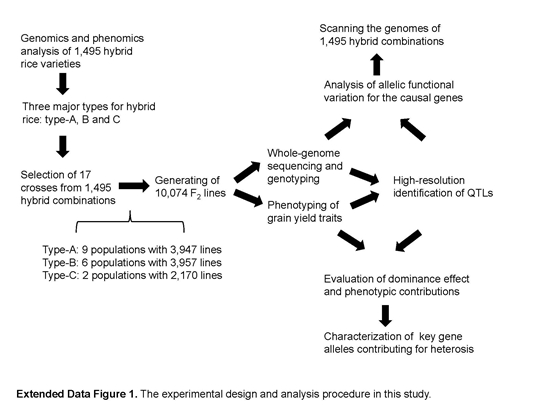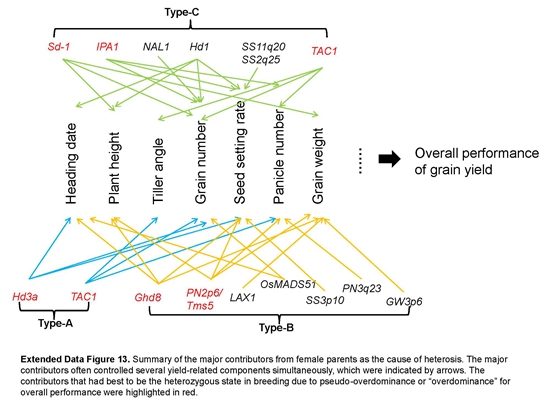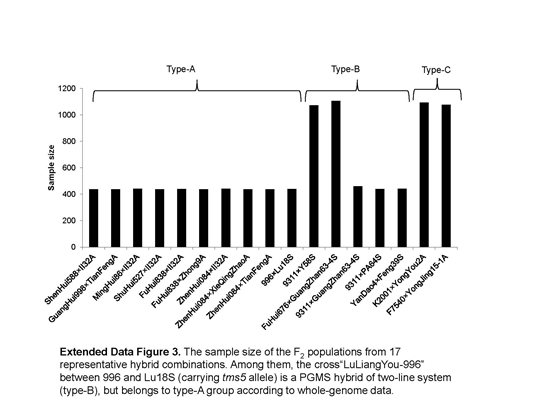分享到
Genomic architecture of heterosis for yield traits in rice
Increasing grain yield is a long-term goal in crop breeding to meet the demand for global food security. Heterosis, when a hybrid shows higher performance for a trait than both parents, offers an important strategy for crop breeding. Many scientists have been carrying out the genetic basis of heterosis in many crops including rice, maize and sorghum.
Recently, scientists from Institute of Plant Physiology and Ecology (SIPPE), Shanghai Institutes for Biological Sciences, Chinese Academy of Sciences and China National Rice Research Institute (CNRRI), Chinese Academy of Agricultural Sciences successfully informed on the genomic architecture of heterosis for yield traits in rice.
Their research included generating, sequencing and recording the phenotypes of 10,074 F2 lines from 17 representative hybrid rice crosses. The large data of genomics and phenomics from the well-designed populations enabled us, for the first time, to identify the genetic contributors comprehensively and find out the exact causes of heterosis. Through the analysis of their research result, modern rice varieties can be classified into three major types, representing different hybrid breeding systems. Although they do not find any heterosis-associated loci shared across all lines, within each group, a small number of genomic loci from female parents explain a large proportion of the yield advantage of hybrids over their male parents. For the individual yield components, the heterozygous state of the heterosis-related genes generally acted through the way of dominance complementation. The hybrids with yield heterosis resulted from an optimal combination of multiple yield-related components, meaning better performance of overall yield in crop productions. The results of this study have elucidated the genetic mechanism of heterosis in rice, which is of great significance in promoting accurate molecular design breeding in rice.
This work was supported by Chinese Academy of Sciences (XDA08020101) and the National Natural Science Foundation of China (31322028, 91535202, 31421093 and 31301302). The research finding has been published in Nature online in September 2016 (DOI: 10.1038/nature.19760). More details are available on the links bellow:
http://www.nature.com/nature/journal/v537/n7622/full/nature19760.html
Recently, scientists from Institute of Plant Physiology and Ecology (SIPPE), Shanghai Institutes for Biological Sciences, Chinese Academy of Sciences and China National Rice Research Institute (CNRRI), Chinese Academy of Agricultural Sciences successfully informed on the genomic architecture of heterosis for yield traits in rice.
Their research included generating, sequencing and recording the phenotypes of 10,074 F2 lines from 17 representative hybrid rice crosses. The large data of genomics and phenomics from the well-designed populations enabled us, for the first time, to identify the genetic contributors comprehensively and find out the exact causes of heterosis. Through the analysis of their research result, modern rice varieties can be classified into three major types, representing different hybrid breeding systems. Although they do not find any heterosis-associated loci shared across all lines, within each group, a small number of genomic loci from female parents explain a large proportion of the yield advantage of hybrids over their male parents. For the individual yield components, the heterozygous state of the heterosis-related genes generally acted through the way of dominance complementation. The hybrids with yield heterosis resulted from an optimal combination of multiple yield-related components, meaning better performance of overall yield in crop productions. The results of this study have elucidated the genetic mechanism of heterosis in rice, which is of great significance in promoting accurate molecular design breeding in rice.
This work was supported by Chinese Academy of Sciences (XDA08020101) and the National Natural Science Foundation of China (31322028, 91535202, 31421093 and 31301302). The research finding has been published in Nature online in September 2016 (DOI: 10.1038/nature.19760). More details are available on the links bellow:
http://www.nature.com/nature/journal/v537/n7622/full/nature19760.html



By Luo Ju
luojurice@126.com
Latest News
-
 Apr 18, 2024Opening Ceremony of the Training Workshop on Wheat Head Scab Resistance Breeding and Pest Control in Africa Held in CAAS
Apr 18, 2024Opening Ceremony of the Training Workshop on Wheat Head Scab Resistance Breeding and Pest Control in Africa Held in CAAS -
 Apr 03, 2024IPPCAAS Co-organized the Training Workshop on Management and Application of Biopesticides in Nepal
Apr 03, 2024IPPCAAS Co-organized the Training Workshop on Management and Application of Biopesticides in Nepal -
 Mar 28, 2024Delegation from the School of Agriculture and Food Science of University College Dublin, Ireland Visit to IAS, CAAS
Mar 28, 2024Delegation from the School of Agriculture and Food Science of University College Dublin, Ireland Visit to IAS, CAAS -
 Mar 25, 2024Director of World Food Prize Foundation visited GSCAAS
Mar 25, 2024Director of World Food Prize Foundation visited GSCAAS -
 Mar 20, 2024Institute of Crop Sciences (ICS) and Syngenta Group Global Seeds Advance Collaborative Research in the Seed Industry
Mar 20, 2024Institute of Crop Sciences (ICS) and Syngenta Group Global Seeds Advance Collaborative Research in the Seed Industry
